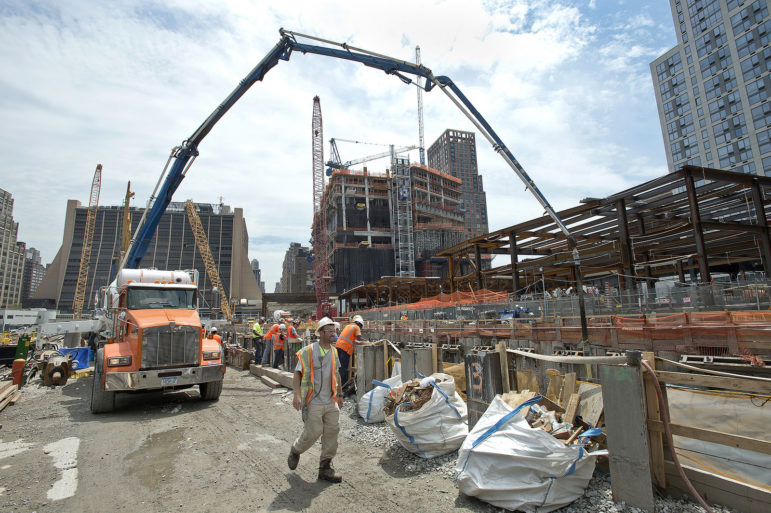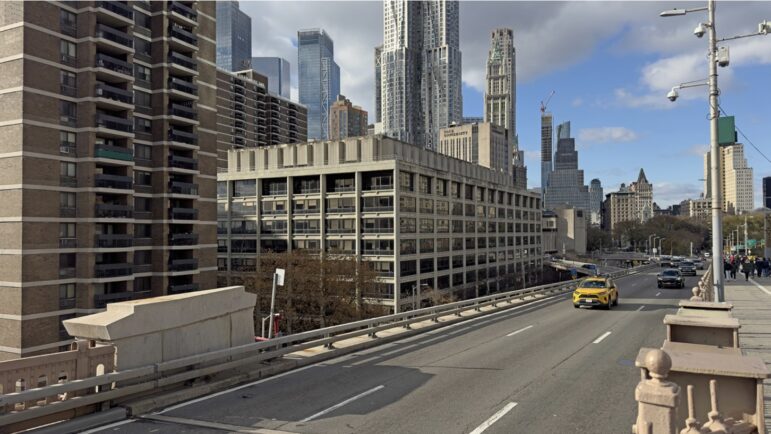
MTA
Work at the Hudson Yards site.
The demonstrations being waged by some unions within the Building and Construction Trades Council of Greater New York (BCTC) outside of the Hudson Yards development project on Manhattan’s West Side are a sad statement on the inability of these unions to compete in today’s workplace.
Let’s put this in perspective. These building trade unions are not picketing a non-union job site. They are picketing a site that probably employs more unionized construction workers than any other private sector development in the United States. They are picketing Related, which is currently the largest employer of private-sector union construction workers in New York City.
How did the BCTC find itself in this moment where it is attacking the very entities that employ its members?
Several of BCTC’s unions have refused to abandon outdated work rules and adopt a more cost-effective and competitive wage and benefit structure. Instead, their leaders espouse progressive rhetoric, railing against income inequality and fair wages for workers – all while many of its members are making annual salaries well over $100,000. They refuse to address work rules that permit some of their members to be paid $42/hour plus overtime to deliver coffee, while running fraudulent scams on the side, charging their colleagues for food and beverages.
The refusal of such unions to make reforms and be more economically competitive has been replicated throughout the city and has led to the rise of open-shop construction. Open shop construction simply means that both union and non-union contractors are provided an opportunity to bid for work on a construction job. In the case of 55 Hudson Yards, which several BCTC unions are picketing, open shop bidding has led to 92 percent of the work going to union contractors. That is not good enough for the BCTC or its non-competitive unions though.
Instead, the BCTC wants developers, including Related, to sign Project Labor Agreements (PLA) which would require all work on a construction site use union labor purportedly in exchange for reduced costs and labor harmony. There was a period of time when many REBNY members signed PLAs. Experience showed, however, that the promise of cost savings was not realized. Furthermore, PLA sites were subject to labor strikes by construction trade unions despite explicit written guarantees that such actions would not occur. As a result, PLAs have been discredited and are being used much less frequently in the private sector.
It is becoming increasingly clear that the wasteful practices of some BCTC unions are not limited to the private sector. Taxpayers are bearing the cost of such practices as well. Media reports early this year showed that subway construction undertaken by the Metropolitan Transportation Authority (MTA) is exponentially costlier when compared to similar projects throughout the world. At the New York City Housing Authority (NYCHA), tenants experience long delays in securing much needed repairs. One common denominator in each instance is that the MTA and NYCHA are bound to use union contractors and laborers only.
One solution would be for such government agencies to employ open-shop construction moving forward. More contractors would bid for the work and it would put pressure on union contractors and laborers to become more competitive and eliminate wasteful practices. Employing open shop construction in public agencies will not win elected officials accolades or endorsements from the politically active building trade unions.
Taxpayers, however, will come out the winners knowing that their tax dollars are being put to better use.









14 thoughts on “CityViews: Unions, Not Developers, Are to Blame for Open-Shop Job Sites in NYC”
Non-union workers need to be educated because they will collect welfare food stamps and they would have no medical because Social Security alone they will never survive don’t have family members contributing money for them to survive Union First Union strong pension annuity Medical the American way don’t be bullshittin look with those Developers are making from their projects billions and they want to pay $20 an hour with no benefits stupidity
Funny how all the articles they write about cutting costs are on the backs of the workers, not their own outrageous profit margins.
This country was made by union hands how dare people complain about our wages our wages even make it better for the nonunion workers pay better lmfao over paid we are the middle class even though some union workers do make over 100 grand big deal they deserve it does any of you know the life exspectincy of a construction worker look it up and tell me we don’t deserve it is any one that reads this at all realize the struggle of living in nyc or longisland what happens if it all went nonunion you would even have less young people living here forcing them to leave and go down south so who is going to make up all that tax money without us here everyone else but I guarantee you will see empty neighborhoods and foreclosed Hines everywhere
John open up the books of the developers . Lets see just how harmful these union agreements have been . What are the salaries of management and the profits of these corporations. How do these compare to other developers in other large cities in the country and in the world . Perhaps if you want to compare NYC Subway construction to French construction . You want to also compare the profits of French developers to NYC developers . While you are comparing their profits you might also compare their share of the tax burden. . The wages of Union workers are irrelevant. What is relevant is the wages compared to the cost of living in the communities they live in and have lived in for multiple decades . Wages adjusted for inflation are down . But you are correct there are many who earn less because they don’t have the agency that Unions provide. Agency to obtain a fair share of the pie from greedy employers . Maybe we can correct that.
Open shop has let to 40 + deaths at NYC construction sites over the last 2 years. Mr. Banks does not account for the fact that Unions ensure contractors pay benefits such as health care and retirement to workers. Open shop firms only pay benefits for a favored few in a company and leaving the majority of workers without healthcare or provide options that workers cannot afford. Thru worker misclassification, open shop contractors rob HUNDREDS OF MILLIONS in tax revenue from the city and State and transfer the burden of healthcare from business to State.
REBNY greed pushs the cost of worker health care onto taxpayers while REBNY is reaping all the benefits of Building in NYC with taxpayer 421a money. New York City rents and real estate values are top in the world and REBNY only wants to pocket more and more while paying hard working tradesman less and less, their greed is out of control.
This set it all: http://www.stoprebnybullies.org
Hey Mr. Banks – come on down. We’ll harness you up, get you outfitted with all the proper PPE then take you out to hang out with us for a day. If you make it through the day, we’ll help you process the new awareness you gained about what we do and what it’s worth.
Then, because you will have been shown a new reality, you can write a follow-up piece that will enequivically refute the garbage you wrote in this one.
Come off it REBNY.
We see through your verbal gymnastics, simplistic “arguments”, and outright lies.
It’s not a question of someone being paid overtime to “deliver coffee”, nor is it a question of delayed subway construction & overruns (which have a myriad of managerial and logistical causes), nor is the reason for lack of repairs at NYCHA (which has a long history of lack of funding and government initiative).
It a much larger question – a question of the survival of unions, and the well-being of thousands of hard-working individuals and their families.
For unions, in all sectors of our society, are a necessary counterbalance to the power and dictates of management. They are a voice for otherwise powerless workers.
And you, Related, want to shamefully muffle, silence and ultimately destroy construction unions by your proposed actions. For the scab open shop ,which Related wants, means open season on unions.
Union labor, sweat & blood built this great city. And it continues to do so.
But Related wants to end all that – with open-shop construction hiring on the second major phase of Hudson Yards —in which they seek to abandon union shop labor and set a precedent. That’s why unions are justifiably fighting back against Related.
Likewise, if Related attempts to deny unions the right to strike –in any circumstance!— they are utterly emasculating these unions, making them into company unions – which is what Related & REMBY really want, isn’t it?
If Related continues on this course, the name “Related” will be remembered not for its soaring buildings, but for its right-wing greed and callous union-busting tactics.
And both the appeal & quality of Related’s edifices will reflect their race to the bottom, in terms of the cheap scab labor they choose to hire. For you get what you pay for, Related, you definitely get what you pay for.
Union labor is the solid bedrock on which this great city was built.
Let’s keep it that way.
“…their leaders espouse progressive rhetoric, railing against income inequality and fair wages for workers – all while many of its members are making annual salaries well over $100,000.”
Meanwhile, dozens of Banks’s bosses make over $10,000,000 annually. The notion that making 1/100 of that ($100,000) precludes one from “railing against income inequality” is insidious, dumb, and always comes from hypocritical paid liars like Banks.
Let’s leave the hard working union members alone and have Deblasio stop giving up 980 million dollars of taxpayer money to the homeless..that’s the real reason the city is in the shape its in its not the unions,it’s the politicians using money where it shouldn’t be used..Stop blaming and using the unions as a scapegoat and let’s get the reveal problems squashed…this city is mismanaged BIGTIME..
John what is your salary? You sit behind a desk and criticize a worker for trying to support his family. You make it sound like $100,000 is a lot of money. Families are struggling to send there children to college. You should put on a hard hat and try working in the freezing cold for one day. Be forced to have your coffee on a dirty bucket or go to the bathroom in a porta John. We are not animals. Maybe non union workers should speak out about not having any medical coverage. A worker should not be afraid for his job when he is in his mid 50’s and he can’t pick up 90 lb of sand. We are not a third world country. Every one has a right to enjoy there retirement years with a small pension. We are not the 1% of America. We are the poor working middle class.
Let’s put it simply if an apartment cost 200 thousand to build was is it sold for a million or more dollars that’s a 400 percent profit. I have no problem opening my financials. I surely don’t recieve anything near 10 percent profit. It Simple math beat down the middle class so we can have low class and high class. That is the reality
So many lies are being fed to the American people about unions…building trade unions in NYC in particular. And it’s a real shame how so many people are now viewing union workers as the enemy of the labor movement in this country. When did we become the enemy of the middle class? When people hear that union construction workers make $100 an hour (I make $90 an hour and work a 35 hr work week btw), most people think members are taking home $2,500 each week in their checks. Sorry, not even close! I live in Brooklyn and claim single/zero on my tax return. So after NYC takes their ridiculously high tax rate from my check (which is about $100 every week btw!), and NYS takes theirs, and the Federal Government takes theirs, and Social Security takes theirs, and Medicare takes theirs, and my cost for medical benefits are taken out (which is $350 a week btw!)…I take home $1,000 or less a week. Yes, funds are also taken out for annuity and retirement as well, but most white collar companies also provide their employees 401k plans as well…which they should. After all, how are we supposed to survive on social security benefits alone when the cost of living is so expensive? A monthly social security check doesn’t even cover one month’s rent! Should we all get accustomed to eating scraps from garbage cans while the rich keep getting richer off the backs of the working people? People need to realize that these greedy real estate developers aren’t selling apartments any cheaper just because they’re saving money on labor. They still get what the real estate market bears…so they just get richer! Wake up people! What the REBNY doesn’t tell the people of this city, is that many of the open shop job sites are flooded with illegal immigrants and immigrants with work visa’s so they can keep labor costs at third world rates…so they can put that much more money in their already over filled pockets. The United States is not a third world country! Everything is extremely expensive here. The average cost of a monthly commuter ticket to NyC on the LIRR is about $400. $400! A loaf of bread is $3, half gallon of milk is $3…you get the picture. The working people of this country need to stand up to the greedy developers and corrupt politicians who are trying to crush the middle class. Think about it…if there are no unions to fight for middle class wages and increases for cost of living, you can best believe that we will all be working for minimum wage. Can you live on that? Definitely not. But if all of these corrupt politicians had to live on minimum wage, you can be sure the minimum wage would be the equivalent of today’s prevailing wage.
Banks earned a base salary of $622,035 in 2015, with perks like money for retirement, deferred compensation and additional non-taxable benefits pushing his total compensation up to $627,335, REBNY’s annual filings with the Internal Revenue Service show.Mar 28, 2017